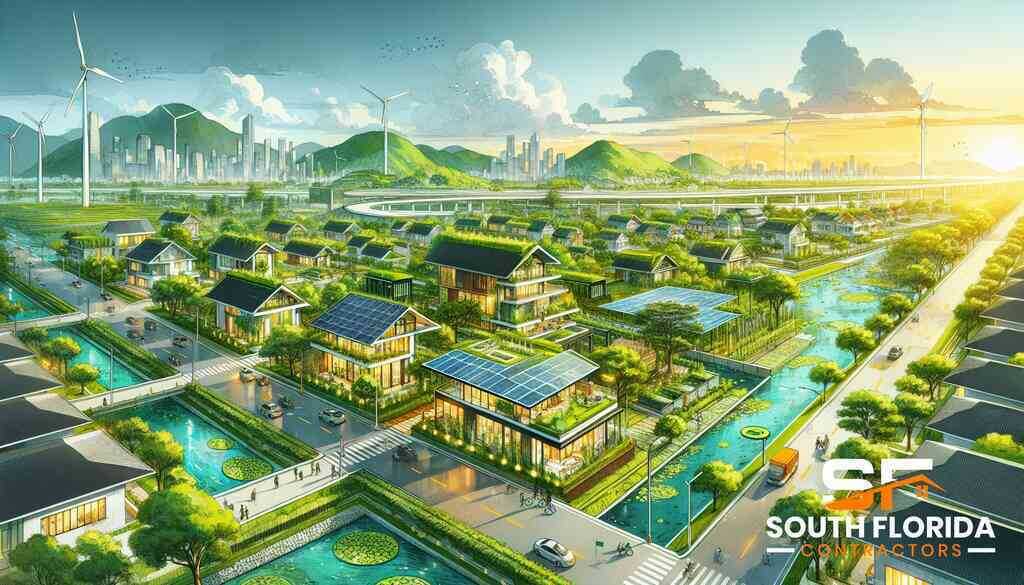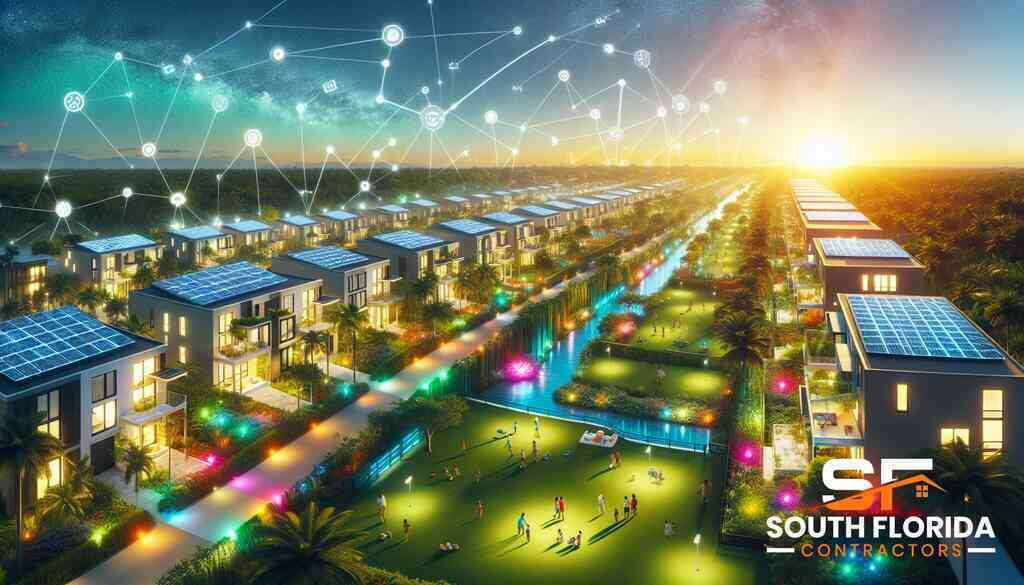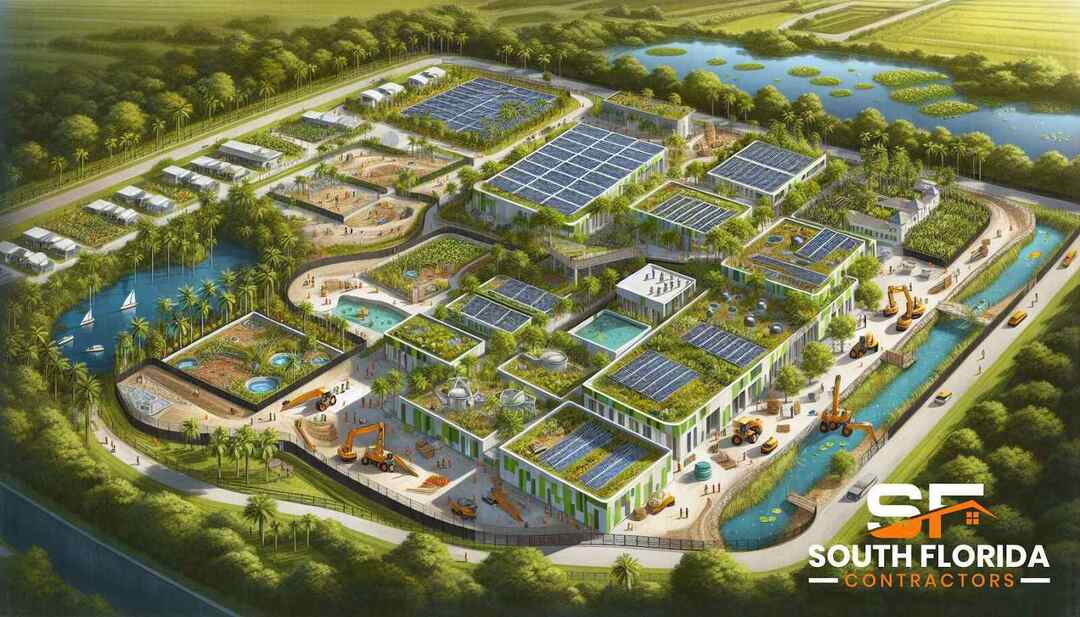
Best Practices for Managing a Parkland Construction
April 20, 2024
Introduction to Parkland Construction Management
Understanding the Unique Challenges of Parkland Construction Projects
Parkland construction management involves navigating a unique set of challenges that differ significantly from urban or suburban development projects. These challenges encompass environmental regulations, community impact considerations, and the inherent unpredictability of working in more natural, often protected, areas. For a South Florida contractor, being adept in addressing these issues is paramount. Effective parkland construction requires a profound understanding of the local ecosystem to minimize disruption and ensure the sustainability of the project. From dealing with protected species to preserving natural waterways, the balancing act between development and conservation is intricate and demands meticulous planning.
Why Choosing the Right South Florida Contractor Matters
Selecting the right South Florida general contractor is crucial for the success of any parkland construction project. This decision affects every aspect of the construction process, from initial planning and adherence to environmental guidelines to the final quality of the work. A contractor with specific experience and expertise in parkland areas will navigate the permitting process more effectively, adhere to stringent environmental considerations, and implement sustainable construction practices from the outset. Their in-depth knowledge of local regulations and established relationships with regulatory bodies can significantly streamline the project timeline and ensure compliance at every stage.
The Role of Sustainable Practices in Modern Parkland Construction
In today’s construction landscape, sustainability is not just a buzzword, it’s a necessary approach, especially in sensitive areas such as parklands. Sustainable construction practices go beyond minimizing environmental impact and also involve utilizing resources more efficiently and incorporating green technologies. By integrating sustainable construction practices, contractors can ensure that parkland projects contribute positively to their surroundings, enhancing rather than depleting local ecosystems. These practices include the use of eco-friendly materials, energy-efficient designs, and construction methods that prioritize the preservation of the natural landscape. Ultimately, sustainable construction in parklands is about leaving a legacy that future generations can enjoy and appreciate, aligning with broader environmental stewardship goals.
Setting the Foundation: Construction Project Planning
Essential Steps in Construction Project Planning
Construction project planning is the cornerstone of any successful parkland construction venture. This process involves several key steps that ensure a project is viable, sustainable, and can be completed within the desired timeframe and budget. Initially, identifying the project’s scope is crucial. A comprehensive understanding of what is to be achieved allows South Florida contractors to tailor their strategies accordingly. Following this, the development of a detailed project plan, which includes timelines, resource allocation, and budgeting, is essential. Incorporating construction project planning from the outset can significantly mitigate potential challenges, enabling a smoother execution phase.
Moreover, involving stakeholders early in the planning process promotes transparency and ensures that all parties are aligned with the project’s objectives. This early engagement is crucial for anticipating and addressing any concerns that may affect project progress. Additionally, the selection of an experienced South Florida general contractor who understands the specific demands of parkland construction is fundamental. Their expertise not only enriches the planning process but also streamlines implementation, ensuring adherence to environmental considerations and local regulations.
Balancing Construction Scope with Budget Management
One of the most challenging aspects of managing a parkland construction project is balancing the scope of work with budget constraints. It’s no secret that expanded project scopes can quickly escalate costs, potentially derailing a project. Effective construction budget management involves detailed and realistic cost estimations early in the planning process. This construction budget management strategy ensures that the project’s financial resources are utilized efficiently, focusing on high-impact areas that align with the project’s goals.
Cost control mechanisms should be implemented to monitor expenses closely, identifying potential overruns before they become problematic. Moreover, leveraging relationships with suppliers and subcontractors can also unlock cost savings, ensuring high-quality materials and services are procured at competitive rates. Contingency planning is another critical element, providing a buffer for unforeseen expenses without compromising the project’s financial integrity or scope.
Importance of Construction Timeline Planning
Timely completion is a critical success factor for parkland construction projects. Effective construction timeline planning involves setting realistic milestones and deadlines, considering the complexities of working within natural environments. Weather conditions, regulatory approvals, and environmental assessments can introduce variations in timelines. Thus, constructing a flexible yet structured timeline is necessary.
Advanced planning tools and techniques can aid in setting a realistic schedule that considers all project facets from inception to completion. Regular progress reviews and adjustments ensure that the project remains on track, even when external factors introduce delays. Effective communication among all stakeholders, facilitated by the South Florida general contractor, is paramount to maintaining project momentum. Collaborative problem-solving and decision-making can preemptively address issues, minimizing their impact on the project timeline.
Meeting Environmental and Safety Standards
Incorporating Environmental Considerations in Construction
In the realm of parkland construction, environmental stewardship is a cornerstone principle, guiding every decision and action. The integration of environmental considerations in construction starts from the foundational planning stages, where South Florida contractors assess the potential impacts on local ecosystems and biodiversity. This assessment is critical for creating a balance between development objectives and the preservation of natural habitats. Strategies such as minimizing land disruption, protecting water quality, and preserving native vegetation are all pivotal in aligning construction activities with environmental sustainability goals. Furthermore, this approach fosters a positive relationship with regulatory bodies and the community, demonstrating a commitment to responsible environmental management. By prioritizing these considerations, contractors not only comply with legal requirements but also contribute to the long-term health and vitality of the parkland’s natural resources.
Adhering to Construction Safety Guidelines
Safety in construction cannot be overstated measures taken to ensure the well-being of workers, visitors, and wildlife are paramount. Adherence to construction safety guidelines is a critical component of parkland construction management, encompassing a broad range of practices from proper equipment use to emergency response planning. South Florida contractors must stay abreast of the latest safety standards and regulations, implementing comprehensive training programs for their teams. Personal protective equipment (PPE), signage, secure fencing, and clear pathways are essential in maintaining a safe construction environment. Moreover, safety measures extend beyond human concerns, including precautions to protect wildlife and prevent habitat disruption. Through diligent adherence to safety protocols, construction activities can proceed smoothly, mitigating risks and fostering a culture of respect and care for both people and the environment.
Best Practices for Sustainable Construction
Sustainable construction in parkland developments is not merely about reducing the environmental footprint, it’s about reimagining how these spaces interact with and enrich their natural surroundings. Utilizing green construction methods is a hallmark of progressive parkland development. These methods include the use of recycled and locally sourced materials, renewable energy installations such as solar panels, and water conservation systems like rainwater harvesting. Moreover, designing structures that enhance natural light and airflow reduces the need for artificial heating and cooling, further diminishing the project’s environmental impact. Bioengineering techniques that stabilize soil and protect waterways also play a crucial role in preserving the ecological integrity of the site. By adopting these sustainable practices, South Florida contractors not only ensure regulatory compliance but also position their projects as exemplars of eco-conscious development, paving the way for a greener future in construction.
Building a Team: Contractor Performance Standards
Selecting the Right South Florida General Contractor
When initiating a parkland construction project, selecting the right South Florida general contractor is a pivotal decision that can determine the success or failure of the entire venture. South Florida contractors bring local expertise and a nuanced understanding of the region’s unique environmental and regulatory landscape. To ensure the optimal selection, project managers should prioritize contractors who showcase a portfolio of successful parkland projects and demonstrate a clear commitment to sustainability and environmental stewardship. It’s also essential to evaluate their reputation within the community, responsiveness to project needs, and the ability to foster collaborative partnerships. A South Florida contractor who aligns with these criteria brings not only their expertise but also a passion for creating spaces that respect and enhance the natural beauty of South Florida.
Setting and Maintaining High Contractor Performance Standards
Maintaining high-performance standards is crucial for achieving excellence in parkland construction. This starts with clear communication of project goals, expectations, and standards from the onset. Implementing a structured performance evaluation system can help in monitoring the contractor’s adherence to project timelines, quality standards, and budgetary constraints. Regular progress reviews and feedback sessions encourage a culture of continuous improvement and accountability. Set realistic, measurable performance metrics that align with the project’s objectives, such as milestones for sustainability, safety compliance, and minimal environmental impact. By fostering an environment where high standards are expected and rewarded, South Florida contractors can exceed project benchmarks, ensuring the delivery of exceptional parkland projects.
Construction Quality Assurance Measures
Construction quality assurance is integral to managing a parkland construction project successfully. It involves systematic processes, procedures, and standards to ensure that the construction output meets the predefined criteria. This begins with the selection of materials, and adherence to construction methods, and continues through to the final inspection of the completed work. Implementing construction quality assurance measures not only ensures the longevity and safety of the parkland but also safeguards the natural ecosystem against potential damage. South Florida contractors need to establish a robust quality assurance plan that includes regular audits, testing of materials, and an effective feedback loop for continuous improvement. This strategic approach towards quality control minimizes the risk of defects, delays, and budget overruns, ultimately underpinning the success of the parkland construction project.
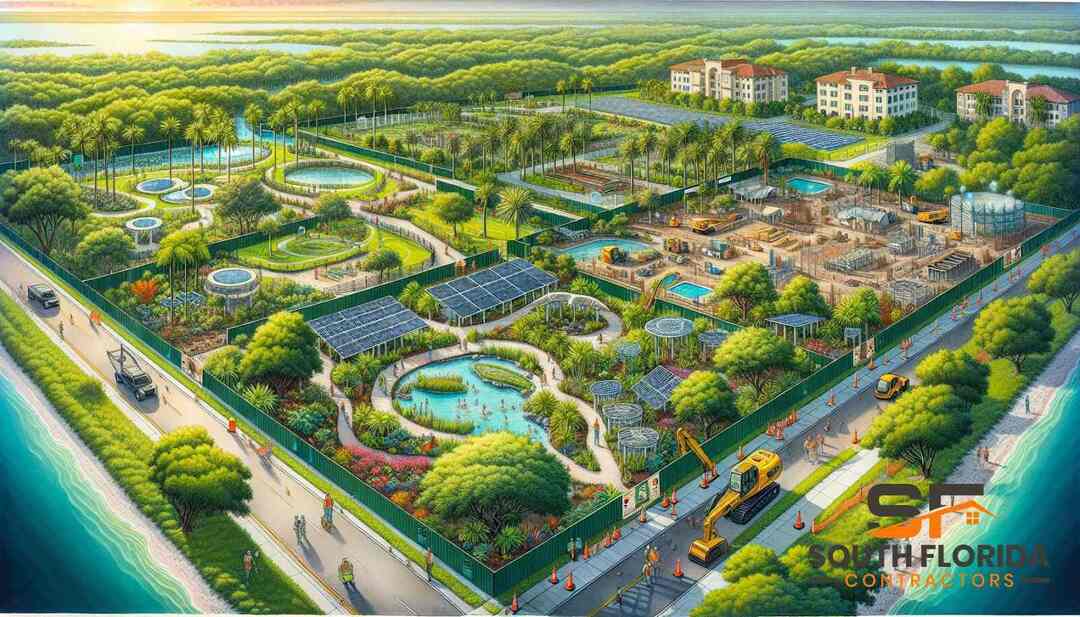
Project Management Excellence in Construction
Utilizing Project Management Tools for Efficient Construction
In the realm of parkland construction management, the utilization of project management tools stands out as a cornerstone for efficient and successful project execution. These digital tools, when skillfully applied, offer unparalleled benefits, streamlining every phase of construction from planning to completion. For a South Florida contractor aiming to navigate the intricacies of parkland construction, adopting project management tools for construction facilitates clear communication, robust scheduling, and accurate budget tracking.
Effective project management tools integrate various aspects of construction management, including task allocation, progress monitoring, and resource management. This integration ensures that all team members, from on-site workers to project stakeholders, are on the same page, reducing misunderstandings and minimizing delays. Furthermore, these tools provide a real-time overview of the project’s status, enabling proactive problem-solving and decision-making. By leveraging these digital resources, South Florida construction companies can enhance their efficiency, maintaining a competitive edge in the booming construction landscape of the region.
Effective Construction Stakeholder Engagement
Construction stakeholder engagement is a critical facet of managing parkland construction projects, ensuring all parties involved are informed, involved, and invested in the project’s success. Effective engagement strategies foster a sense of ownership and collaboration among stakeholders, from local government bodies and environmental groups to community members and investors. For contractors in South Florida, mastering the art of stakeholder engagement means utilizing a combination of construction stakeholder engagement practices tailored to the unique needs and concerns of each group.
Communication is the linchpin of effective stakeholder engagement-providing regular updates, soliciting feedback, and transparently addressing concerns build trust and encourage continuous support. Organizing meetings, workshops, and site visits can also enhance engagement, offering stakeholders a firsthand look at the project’s progress and how their inputs are shaping the development. Moreover, leveraging digital platforms for interactive discussions and updates can significantly broaden the engagement reach, accommodating stakeholders’ diverse schedules and locations. By prioritizing stakeholder engagement, South Florida contractors not only navigate the regulatory and community landscape more smoothly but also pave the way for a more inclusive and widely supported project outcome.
Mastering Construction Risk Management
The dynamic and often unpredictable nature of parkland construction projects necessitates a robust approach to construction risk management. Effective risk management involves the identification, assessment, and mitigation of potential risks that could threaten the project’s success, from environmental challenges and regulatory hurdles to unforeseen costs and timeline delays. Mastering construction risk management equips South Florida contractors with the foresight and flexibility to navigate uncertainties, safeguarding the project against setbacks.
Key components of successful construction risk management include thorough risk assessment during the project planning phase, which allows for proactive measures to be put in place. Additionally, maintaining a flexible project plan that can adapt to evolving situations is crucial. By employing strategies such as contingency planning and regular risk reviews, contractors can anticipate potential issues and address them before they escalate. Furthermore, fostering strong relationships with suppliers, subcontractors, and other partners can create a supportive network, enhancing the project’s resilience to risks. For South Florida contractors, proficient risk management is not only about minimizing losses but also about creating a foundation of trust and reliability with stakeholders, ultimately leading to smoother project execution and enhanced outcomes.
The Blueprint of Construction Contract Administration
Essentials of Construction Contract Administration
Construction contract administration is a pivotal component of parkland construction management, acting as the linchpin between the project’s paper plan and its physical realization. At its core, contract administration encompasses the processes, systems, and actions to manage contracts effectively from inception through to completion and beyond. For South Florida contractors, mastering the essentials of construction contract administration means ensuring that all project activities align with the contractual commitments, specifications, and drawings.
Effective contract administration involves drafting clear, comprehensive contracts that accurately reflect the project scope, terms, conditions, and responsibilities of all parties. This is a crucial step to prevent misunderstandings that could lead to disputes or litigation. Additionally, maintaining detailed records, such as contract modifications, approvals, and performance reports, is essential for transparency and accountability. By adhering to these practices, contractors in South Florida can navigate the complexities of parkland construction projects, ensuring that all contractual obligations are met efficiently and effectively.
Managing Contracts to Avoid Disputes and Delays
Managing contracts in the realm of parkland construction requires a proactive approach to minimize risks of disputes and delays. Disputes often arise from unclear contractual terms, misinterpretations, or unmet expectations, while delays can be attributed to various factors, including unforeseen site conditions, supply chain issues, or regulatory obstacles. South Florida contractors must emphasize clear communication, early identification of potential issues, and flexible problem-solving strategies to manage contracts effectively.
Implementing structured change management processes is another critical aspect, enabling contractors to handle modifications in scope or conditions while maintaining control over timelines and costs. Regular meetings with stakeholders, including the project team, clients, and subcontractors, facilitate ongoing dialogue and issue resolution. By adopting these management strategies, contractors can build robust mechanisms to avoid disputes and delays, paving the way for smooth execution and successful completion of parkland construction projects.
Ensuring Transparency and Ethics in Contract Management
Transparency and ethics form the foundation of trust in any construction project. In parkland construction, where projects often involve significant environmental and community impacts, upholding these principles is especially critical. South Florida contractors must ensure that all aspects of contract management-from bidding processes to subcontractor selection and financial transactions are conducted with the highest standards of integrity and openness.
This involves clear, honest communication with all project stakeholders, including clients, regulatory bodies, and the community. South Florida general contractors should also commit to ethical practices, such as fair labor practices and environmentally responsible construction methods. Establishing and adhering to a code of conduct that emphasizes ethical behavior and transparency can help mitigate risks, foster positive relationships, and enhance the reputation of contractors in the competitive South Florida construction landscape. By embodying these values, contractors can lead by example, contributing to the sustainable and ethical growth of the construction industry in the region.
Innovative Approaches to Construction Site Management
Adopting Green Construction Methods
As the awareness around environmental sustainability grows, the construction industry, particularly in parklands, has been adapting to meet the new demands for greener practices. Adopting green construction methods in parkland projects is no longer just a trend but a necessity. These methods include prioritizing the use of eco-friendly and recyclable materials, reducing waste through efficient material planning and recycling, as well as harnessing renewable energy sources whenever possible. For instance, using solar-powered equipment can significantly reduce the carbon footprint of a construction project. Moreover, these practices not only help safeguard the environment but can also lead to cost savings through more efficient use of resources and materials, emphasizing the importance for South Florida contractors to stay ahead in green construction methodology.
Strategies for Efficient Construction Site Management
Efficient construction site management is crucial for the timely and cost-effective completion of parkland projects. This involves a multifaceted approach that prioritizes meticulous planning, stringent oversight, and the flexibility to adapt to unforeseen challenges. Key strategies include the establishment of clear communication channels among all project stakeholders, from home builders in Florida to subcontractors and suppliers, ensuring that everyone is aligned with the project objectives and timelines. The implementation of just-in-time inventory practices can minimize waste and reduce storage costs, while regular site audits help identify and rectify inefficiencies. For South Florida contractors, leveraging their local knowledge and networks to anticipate and manage logistical challenges is essential. By adopting these strategies, contractors can streamline construction processes, mitigate potential issues, and maintain a focus on safety and quality standards.
Implementing Advanced Technologies for Site Monitoring
The role of technology in revolutionizing parkland construction management cannot be overstated. Implementing advanced technologies for site monitoring enhances project oversight, allows for real-time tracking of progress, and identifies potential issues before they escalate. The use of drones for aerial site surveys provides a comprehensive overview of the construction progress, enabling South Florida general contractors to efficiently allocate resources and adjust schedules as needed. Similarly, employing IoT (Internet of Things) devices for equipment and material tracking ensures optimal utilization and reduces the risk of theft or misplacement. Integration of construction management software offers a centralized platform for documentation, communication, and project tracking, fostering a more organized and transparent work environment. As these technologies become more accessible and cost-effective, their adoption by construction companies in South Florida is set to redefine the standards of efficiency, safety, and productivity in parkland construction projects.
Ensuring Community and Stakeholder Engagement
The Importance of Early Stakeholder Involvement
In the context of parkland construction management, early stakeholder involvement is crucial for the seamless execution and acceptance of construction projects. Engaging stakeholders at the outset enables South Florida contractors and project managers to identify concerns, expectations, and suggestions that can significantly influence the project’s direction and outcomes. Prioritizing this early engagement demonstrates respect for community values and environmental standards, aligning the project more closely with local priorities and reducing potential resistance.
By embracing the input of stakeholders – which can range from local government agencies and environmental groups to residents and local businesses – project teams can ensure a more inclusive approach, fostering a sense of community ownership and support from day one. This early dialogue can also surface innovative solutions to complex problems, leveraging local knowledge and fostering partnerships that may prove valuable throughout the construction process.
Strategies for Effective Community Engagement
Effective community engagement in parkland construction projects demands a strategic and thoughtful approach. South Florida contractors can implement several strategies to ensure meaningful participation and foster positive relationships with the community. Hosting public forums and informational meetings is a foundational step, providing a platform for disseminating project information and garnering feedback. Tailoring these sessions to be interactive and inclusive encourages active participation and allows for constructive dialogue.
Another vital strategy is to maintain ongoing communication through updates in local media, social media channels, and direct mailings. This keeps the community informed of progress, any changes to plans, and the benefits the project will bring to the area. Engaging in Corporate Social Responsibility (CSR) activities, such as sponsoring local events or contributing to community initiatives, can also enhance the public perception of the project and the entities involved.
Furthermore, establishing a dedicated feedback channel where concerns, questions, and suggestions can be addressed promptly is essential for maintaining trust and transparency. By remaining open, responsive, and adaptive to community feedback, South Florida contractors can navigate potential challenges more smoothly, ensuring the project is viewed as a positive addition to the area.
Building a Communication Plan for Construction Projects
The cornerstone of successful community and stakeholder engagement is a meticulously crafted communication plan that outlines how to interact with all project stakeholders effectively. This plan should identify the key messages, preferred communication channels, and frequency of updates to ensure consistent and transparent information flow throughout the construction process. Differentiating communication strategies to cater to diverse stakeholder groups is also vital, considering that local authorities, environmental organizations, and the general public may have varying interests and requirements.
For optimal efficacy, the plan should incorporate a mix of traditional and digital communication methods, such as press releases, community meetings, a project website, and social media updates. Including strategies for crisis communication is also critical, preparing the team to handle unforeseen events or negative feedback proactively.
In addition, soliciting feedback and actively listening to stakeholder concerns should be integral components of the communication plan. This two-way communication fosters an environment of collaboration and mutual respect, paving the way for a successful project that meets or exceeds community expectations. By emphasizing transparency, responsiveness, and inclusivity in the communication plan, South Florida contractors can mitigate risks, enhance project acceptance, and build lasting positive relationships with the community and other stakeholders.
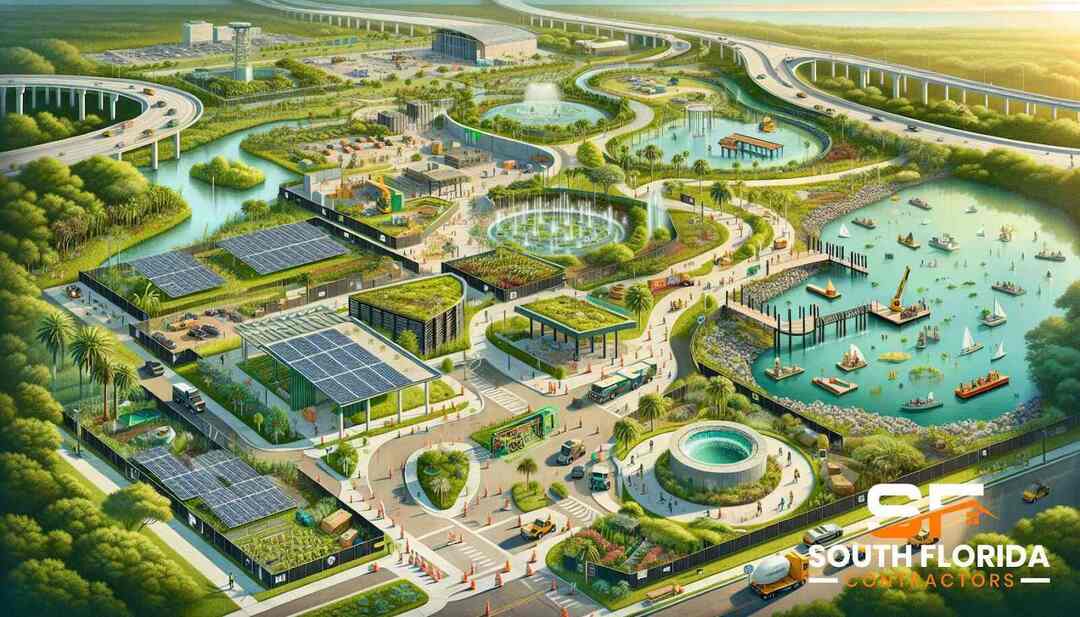
Financial Strategies: Budgeting and Cost Control
Construction Budget Management Best Practices
Effective financial management lies at the heart of successful parkland construction projects, requiring meticulous attention to budgeting practices. A fundamental step is developing a comprehensive budget that accounts for all potential costs, from material expenses and labor costs to permits and environmental assessments. This holistic approach ensures that every facet of the project is financially accounted for, reducing the risk of unexpected expenditures. Incorporating contingency funds is also a best practice, providing a financial safety net for unforeseeable issues that could otherwise derail the project’s financial stability. For South Florida contractors, leveraging their local market knowledge can lead to more accurate budgeting, as they can anticipate costs more effectively based on regional trends and pricing.
Moreover, adopting a phased approach to budget release can further tighten financial control. This method involves allocating funds in stages, based on project milestones, which enables a more focused and disciplined expenditure aligned with project progress. Regular financial reviews and audits are essential to ensure that spending aligns with the budget, allowing for timely adjustments as needed. By adhering to these budget management best practices, contractors can maintain financial health, ensure project viability, and avoid cost overruns, guaranteeing the successful completion of parkland construction projects.
Techniques for Effective Cost Control
Effective cost control in parkland construction is not merely about keeping expenses within budget, it’s about maximizing the value received for every dollar spent. To achieve this, construction management techniques become indispensable tools for South Florida contractors. Implementing value engineering, a systematic method to improve the “value” of goods or products and services by using an examination of function, can lead to significant cost savings without compromising on quality or performance. This approach encourages creativity and innovation in finding more cost-effective construction methods and materials that meet project requirements.
Procurement strategies also play a critical role in cost control. By negotiating contracts with suppliers and subcontractors, contractors can secure more favorable terms and pricing, which can lead to substantial cost reductions over the project’s lifespan. Bulk purchasing and early procurement of materials can further lock in prices, protecting the project from market fluctuations that could increase costs.
Another key technique is the rigorous monitoring of labor costs, which often constitute a significant portion of construction expenses. This involves regular tracking of labor hours against the budget and adjusting workflows or schedules to improve efficiency and reduce overtime costs. Utilizing technology, such as project management software, can streamline these processes, offering real-time insights into labor productivity and cost implications. By employing these cost control techniques, South Florida contractors can ensure financial discipline, optimize resource utilization, and deliver parkland construction projects within budget thresholds.
Avoiding Financial Overruns in Construction Projects
Financial overruns can jeopardize the success of parkland construction projects, turning potentially beneficial developments into financial burdens. A preemptive approach to avoiding these overruns involves thorough risk assessment during the planning phase. Identifying and quantifying potential financial risks – such as escalating material costs, labor shortages, or regulatory changes – allows for the integration of appropriate mitigations in the project budget. For contractors in South Florida, local knowledge of construction challenges and market conditions is invaluable in accurately forecasting potential financial risks.
Engaging in detailed contract negotiations with all project stakeholders, including suppliers, subcontractors, and clients, also provides a strategic advantage. Contracts that clearly define the scope, deliverables, timelines, and payment terms can minimize the potential for disputes or misunderstandings that often lead to additional costs. Including clauses that address contingency actions for known risks can further protect against financial overruns.
Continuous financial tracking and project monitoring are fundamental to the early detection of budget deviations. Implementing a responsive change management process allows for swift adaptations to changing circumstances while maintaining oversight of the budget impact. This agility in management, combined with a commitment to adherence to the project plan and budget, can significantly reduce the likelihood of encountering financial overruns. Through meticulous planning, strategic contract management, and vigilant financial oversight, South Florida contractors can steer parkland construction projects clear of financial pitfalls, ensuring both their success and profitability.
Focusing on Quality and Sustainability
Incorporating Construction Quality Assurance Processes
Quality assurance (QA) in construction is a systematic process aimed at ensuring that all aspects of a project meet or exceed the set standards and specifications. For a successful parkland construction project in South Florida, incorporating robust construction quality assurance processes from the onset is non-negotiable. This starts with the development of a comprehensive QA plan that outlines the quality objectives, standards, methodologies, and responsibilities across the project lifecycle.
Regular inspections and audits are a hallmark of effective QA. These should be carried out by skilled personnel at different stages of the construction process to identify and rectify any deviations from the desired quality standards. Employing the latest technologies, such as Building Information Modeling (BIM), can enhance the accuracy of these inspections, providing detailed insights into the construction progress and potential quality issues.
Documentation plays a crucial role in QA, serving as a record of adherence to quality standards and guidelines. This includes detailed reports of inspections, test results, and corrective actions taken, ensuring accountability and providing a reference point for future projects. By prioritizing construction quality assurance processes, South Florida contractors can minimize rework and defects, ensuring the longevity and sustainability of parkland construction projects while fostering trust among stakeholders.
Embracing Sustainable Construction Practices
Sustainable construction practices have become a necessity, not a choice, in the face of global environmental challenges. Parkland construction projects offer a unique opportunity for South Florida contractors to lead by example, showcasing how the built environment can coexist harmoniously with nature. Embracing sustainable construction practices begins with the mindful selection of materials-prioritizing those that are recycled, renewable, and locally sourced reduces the carbon footprint and supports the local economy.
Energy efficiency is another critical aspect. Incorporating passive solar design, energy-efficient lighting, and HVAC systems, and investing in renewable energy sources like solar panels can significantly reduce a building’s environmental impact. Water conservation measures, such as rainwater harvesting and greywater recycling systems, further affirm a project’s commitment to sustainability.
Beyond the immediate environmental benefits, sustainable construction practices also contribute to healthier indoor environments, improving air quality and natural light. This can enhance the well-being of occupants and potentially lead to higher property values. As awareness and demand for green building continue to rise, South Florida contractors who excel in sustainable construction are well-positioned to thrive in the evolving construction landscape.
Long-term Benefits of Quality and Sustainability in Construction
Quality and sustainability in construction are intimately linked- both aim to meet present needs without compromising the ability of future generations to meet their own. The long-term benefits of integrating these elements into parkland construction projects are manifold. For one, they lead to the creation of structures that are not just durable but also adaptable, capable of withstanding the test of time and evolving environmental conditions.
Economically, investments in quality and sustainability can yield significant returns over the lifecycle of a construction project. Reduced maintenance and operational costs, coupled with increased energy efficiency, lower the total cost of ownership, making sustainable projects more attractive to investors and end-users alike. Furthermore, such projects often enjoy expedited permit approvals and may qualify for green building certifications and incentives, enhancing their marketability.
On a broader scale, quality and sustainable construction practices contribute to the well-being of communities and the preservation of the environment. They foster healthier living conditions, promote biodiversity, and help mitigate climate change by reducing greenhouse gas emissions. For South Florida contractors, embracing these principles is not just a business strategy-it’s a commitment to building a better future for South Florida and beyond.
Conclusion: Building the Future of Parkland Construction
Recap of Parkland Construction Management Best Practices
Parkland construction management is a multifaceted endeavor that requires a comprehensive understanding of the unique challenges and opportunities presented by such projects. Throughout this discussion, we have explored a variety of best practices essential for ensuring the success and sustainability of parkland construction efforts. From the initial planning stages, where the scope and budget must be clearly defined and aligned, to the importance of adhering to environmental and safety standards, these practices form the backbone of effective project management. The employment of experienced South Florida contractors who are well-versed in navigating local regulations and fostering sustainable construction methodologies is non-negotiable. Furthermore, leveraging advanced project management tools and engaging proactively with stakeholders enhances efficiency and community buy-in, respectively.
The Integral Role of Home Builders and Contractors in Shaping Parkland
Home builders and contractors play a pivotal role in the development of parkland areas. Their expertise, commitment to quality, and adherence to sustainable practices directly impact the success of these construction projects. In South Florida, the responsibility of contractors extends beyond mere construction, it involves safeguarding the region’s unique ecosystem while providing innovative solutions that meet the community’s needs. Effective construction management in parklands is not just about building structures but creating environments that enrich local biodiversity and offer recreational opportunities for future generations. Contractors and builders who prioritize eco-friendly materials and green building techniques contribute significantly to the preservation of natural beauty and sustainability of the region.
Looking Ahead: The Evolving Landscape of Construction in South Florida
The landscape of construction in South Florida is continually evolving, shaped by technological advancements, environmental considerations, and shifting societal demands. As we look to the future, the integration of smart technology and IoT devices in construction projects will likely become more prevalent, offering enhanced monitoring and management capabilities. Furthermore, the growing emphasis on sustainability and resilience in the face of climate change will drive innovation in green building practices and materials. For South Florida contractors and home builders, staying ahead of these trends and adapting to new standards will be essential for success. Moreover, as the community’s engagement and expectations evolve, embracing a collaborative approach to construction projects will ensure that development in parkland areas remains aligned with environmental objectives and societal values. By adopting these forward-looking strategies and continuing to refine the best practices discussed throughout this blog post, South Florida Contractors are well-positioned to lead the charge in sustainable and impactful parkland construction, setting a benchmark for excellence in the construction industry.
Frequently Asked Questions
Question: What makes South Florida Contractors stand out when it comes to parkland construction management?
Answer: South Florida Contractors brings unmatched expertise and a deep commitment to environmental stewardship to every parkland construction project we undertake. Our team of highly skilled South Florida general contractors and home builders in Florida are not only familiar with the unique ecosystem of the region but are also adept at navigating local regulations and fostering sustainable construction methodologies. We prioritize using eco-friendly materials and green building techniques, aiming to minimize our environmental footprint while delivering durable, high-quality construction. By choosing us, you entrust your project to professionals who balance development objectives with the preservation of natural habitats, ensuring a legacy that future generations can enjoy and appreciate.
Question: How do South Florida Contractors ensure adherence to construction safety guidelines in parkland construction projects?
Answer: At South Florida Contractors, safety is paramount. We rigorously adhere to the latest construction safety guidelines, ensuring the well-being of our workers, visitors, and the surrounding wildlife. Our South Florida general contractors and construction teams undergo comprehensive training in best safety practices, from proper equipment use to emergency response planning. We employ a broad range of safety measures including the use of personal protective equipment (PPE), secure fencing, clear signage, and safe pathways. Our commitment to safety extends beyond human considerations, we take ample precautions to prevent habitat disruption and protect local wildlife, reflecting our holistic approach to construction safety and environmental preservation.
Question: In the blog post “Best Practices for Managing a Parkland Construction”, sustainable construction practices are emphasized. How do South Florida Contractors incorporate these practices into their projects?
Answer: Our emphasis on sustainable construction practices is a cornerstone of our operations. We integrate green construction methods from the project’s inception, focused on enhancing rather than depleting the local ecosystems. Our approach includes the selection of eco-friendly and recyclable materials, optimizing resource use, and reducing waste through efficient planning. We also prioritize energy efficiency, from using solar-powered equipment to incorporating designs that maximize natural light and airflow, thus reducing the need for artificial energy sources. Moreover, we actively employ water conservation techniques, such as rainwater harvesting and greywater recycling. By adopting these sustainable practices, South Florida Contractors demonstrates a steadfast commitment to environmental stewardship, ensuring that our parkland construction projects contribute positively to their surroundings and set a standard for eco-conscious development in South Florida.
Question: Can you explain the importance of construction project planning in ensuring the success of a parkland construction project by South Florida Contractors?
Answer: Construction project planning is crucial in setting the foundation for a successful parkland construction project. At South Florida Contractors, we meticulously define the project scope and objectives to tailor our strategies accordingly. Our detailed planning encompasses timelines, resource allocation, budgeting, and contingency measures to address unforeseen challenges. Early stakeholder engagement is part of our planning process, fostering transparency and alignment among all parties involved. By choosing a South Florida general contractor from our team, you benefit from an expert who enriches the planning process with their local knowledge and experience, ensuring compliance with environmental considerations and local regulations. This careful planning significantly mitigates potential challenges, enabling us to execute parkland construction projects smoothly and efficiently, always keeping sustainability and community impact at the forefront of our operations.
Question: How do South Florida Contractors manage construction budgets and avoid financial overruns in parkland projects?
Answer: Managing the construction budget effectively is paramount to avoiding financial overruns, a principle we adhere to diligently at South Florida Contractors. We start by developing a comprehensive and realistic budget, taking into account all potential costs and integrating a contingency fund to cater for unforeseen expenses. Our in-depth knowledge of the South Florida market enables us to make accurate cost estimations. We adopt a phased approach to budget release, aligning expenditure with project milestones, and conducting regular financial reviews to ensure alignment with the budget. Negotiating favorable terms with suppliers and subcontractors, leveraging bulk purchasing, and early procurement strategies also help us control costs. Our proactive, disciplined financial management practices ensure the successful completion of parkland construction projects within the set budget, maximizing value for our clients.

